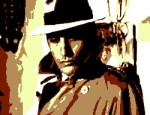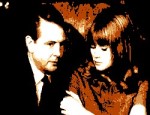Film Review

The film certainly has immense emotional impact, but the over-stylisation and contrived plot elements prevent it from being as powerful as it deserves to be, given the story it has to tell. The very idea of a beautiful concert singer and her tenor boyfriend slipping off to the Western Front to sing Christmas Carols has an uncomfortable whiff of Hollywood sentimentality about it and this greatly diminishes the grandeur of the moment. Yet, for all its creaking artifice, the whole film is played with such sincerity that it still manages to bring a lump to the throat and a few warm tears to the eye.
To see how the film should have been made, one only has to watch Jean Renoir's humanist masterpiece La Grande illusion (1937), which covers similar territory but with far less schmaltz and far greater impact. Although Joyeux Noël is beautifully filmed and well acted, it feels strangely remote and detached from reality - it's hard to believe that it portrays a real event. The gruesome battle scenes near the start of the film are very quickly forgotten and the film quickly sacrifices realism for artistic style and dramatic impact. Far from the familiar images of destruction and misery, the film portrays the Western Front as a Winter Wonderland, where soldiers wear pristine clean uniforms, can laugh easily and bear no scars of battle. How can an audience believe in the truth of the story - that enemy soldiers really did fraternise at Christmas in 1914 - when it's quite obvious that what we are seeing is an obviously sanitised view of history?
Whilst it is easy to pick up on its defects, it cannot be denied that Joyeux Noël is still a moving and rewarding piece of cinema. The sequence in which the unnatural silence in No Man's Land is broken by a German rendition of “Silent Night, Holy Night” is heartrending in the extreme - although this may be due to one's awareness that this unlikely event really did happen. Another touching scene is where the soldiers clear away the bodies of their fallen comrades - if such a spirit of cooperation between the nations of Europe had existed at a higher level, the Great War could have been resolved peacefully within months instead of dragging on pointlessly for another four years of blood-soaked misery. Perhaps the one message to take away from this intensely evocative film is that we should not reserve our kindness and compassion for just one day of the year; we should instead live our lives as though every day were Christmas Day, exchanging good will and cheer with all, not revelling in a blind stupor of self-interest and contempt.
© James Travers 2006
The above content is owned by frenchfilms.org and must not be copied.
Film Synopsis
24th December 1914. Five months into World War I, regiments of French and Scottish troops face off their German opponents in the muddy, snow-covered wastes of No Man's Land. After some fierce fighting, a strange lull has descended on the trenches. The Germans have even started to put up Christmas trees. A tenor, Nikolaus Sprink, is called away from his unit to sing before Kaiser Wilhelm and a gathering of German officers at a nearby country house. He is accompanied by his lover, Anna Sörensen. When Nikolaus insists on returning to his comrades in the trenches to sing that night, Anna persuades him to take her with him. After the tenor has sung “Silent Night”, a volley of applause erupts from the French and British trenches. Officers from the three sides meet and agree a ceasefire for that night. The men who had only a day before been ordered to kill one another leave their trenches to exchange greetings and modest gifts of chocolate and alcohol. A Scottish priest gives a mass and Anna sings “Ave Maria”. The break in hostilities continues into Christmas Day, when the soldiers agree to bury their dead. Others make use of the unexpected peace to play football or card games. They take cover in each other's trenches when artillery barrages break out. The next day, it's business as usual. When the generals hear what has happened, they are outraged. In their eyes, fraternisation equates to treason…© James Travers
The above content is owned by frenchfilms.org and must not be copied.
Similar Films
Here are some other films you may enjoy watching:- Cross of Iron (1977)
- Les Misérables (1995)
- Survivre avec les loups (2008)
- La Peur (2015)
- Capitaine Conan (1996)
Other related links:
Film Credits
- Director: Christian Carion
- Script: Christian Carion
- Cinematographer: Walther van den Ende
- Music: Philippe Rombi
- Cast: Diane Kruger (Anna Sörensen), Natalie Dessay (Anna Sörensen (singing voice)), Benno Fürmann (Nikolaus Sprink), Rolando Villazón (Nikolaus Sprink (singing voice)), Guillaume Canet (Audebert), Gary Lewis (Palmer), Dany Boon (Ponchel), Daniel Brühl (Horstmayer), Lucas Belvaux (Gueusselin), Alex Ferns (Gordon), Steven Robertson (Jonathan), Frank Witter (Jörg), Bernard Le Coq (Le général), Ian Richardson (L'évêque), Thomas Schmauser (Le Kronprinz), Joachim Bißmeier (Zimmermann), Robin Laing (William), Michel Serrault (Le châtelain), Suzanne Flon (La châtelaine), Calum Beaton (Joueur de cornemuse écossais)
- Country: France / Germany / UK / Belgium / Romania / Norway
- Language: French / German / English / Latin
- Support: Color
- Runtime: 116 min
- Aka: Merry Christmas ; Happy Christmas
The very best French thrillers

The very best of the French New Wave

The best of Indian cinema
